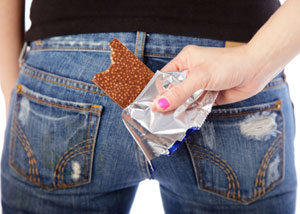 Hoarding food is something that I talk about frequently in adoption preparation classes. It is common and to be expected that children who have not always had enough and not had parents to look out for their best interests would want to hide food for later. Parents need to be vigilant to clean out pockets so chocolate bars do not go through the wash, and clean up rooms to avoid rodents, insects, and rotting food. In cases of adoption, I encourage parents to be calm, avoid commenting on the behavior, and patiently wait for it to extinguish itself, which it will in the majority of cases.
Hoarding food is something that I talk about frequently in adoption preparation classes. It is common and to be expected that children who have not always had enough and not had parents to look out for their best interests would want to hide food for later. Parents need to be vigilant to clean out pockets so chocolate bars do not go through the wash, and clean up rooms to avoid rodents, insects, and rotting food. In cases of adoption, I encourage parents to be calm, avoid commenting on the behavior, and patiently wait for it to extinguish itself, which it will in the majority of cases.
There is less written about food hoarding in adults, although there is some written about older adults who hoard food, particularly those that have lived through the Great Depression. Primarily, hoarding food is a sign of anxiety surrounding the availability of food and sometimes it is a compulsion, something that one feels driven to do to ease anxiety. There is a slightly higher percentage of females than males that hoard food, and often the hoarder lives alone and is mostly socially isolated. Nearly three out of every four adults that hoard food do not believe that it is a problem.
Hoarding food is also a lesser discussed symptom of an eating disorder as well. It is most understood as a symptom of bulimia when a sufferer stashes away binge food items. Food hoarding can also be a symptom of anorexia, however. In the throes of anorexia, sufferers can become obsessed with food despite the fact that they will not allow themselves to ingest it. It can be comforting to anorexia sufferers to have food items available, especially if their body has transition into a starvation mode.
Rotting food, rodents, and insects are perhaps the biggest danger of hoarding food. With these can come disease. Although those that tend to hoard food are already socially isolated, food hoarding can make it more likely for someone to isolate themselves in an attempt to hide this behavior. Hoarding relieves anxiety for sufferers, so treatment actually causes more emotional distress than the actual behavior in most cases.
While medication can reduce comorbid anxiety and depression to a degree, it has not been shown to terminate hoarding behaviors of any kind. The most effective treatment thus far has been Cognitive Behavioral Therapy (CBT), which helps a client work through the thoughts surrounding a behavior empowering him or her to change that behavior. If hoarding food is a part of an eating disorder, the primary focus of treatment should be on the eating disorder rather than the hoarding behavior. If a friend or family member is hoarding food, forcefully eliminating their stash will not help them recover. It may increase their anxiety, ramping up the behavior and/or damaging your relationship, and it will likely leave you feeling frustrated when they return to their old habits.

I am going to help a hoarder clean out their refrigerstor. How should I approach this as it is something I have been sent to do. I am a Home and Community Carer
My 79 year old mother hides food. She has CHF and is hiding foods she is not supposed to eat. The food and/or left overs rot. This has happened nearly daily.
Over the years, before her dx of congestive heart failure (spring of 2017), she had been diagnosed with white matter disease which has diminished her cognitive abilities.
Three years ago I was finding empty pizza boxes behind the washer or under clothes in the closet. So this behavior is not entirely new. But over the past year it has ramped up!
It is frustrating for her caregiver and the entire family. What can we do?
We have a family member who insists on getting dinner companions uneaten food. She gets quite upset if they just want to leave their extra food there to be thrown away. She brings baggies to take home this food. She grew up with adequate food. Her mother wasn’t too good at mothering and basically she was raised by grandparents. Her parents were divorced and father would visit on weekends bringing extravagant gifts. We have been wondering about this obsession with the left over foods often times no more than scraps.